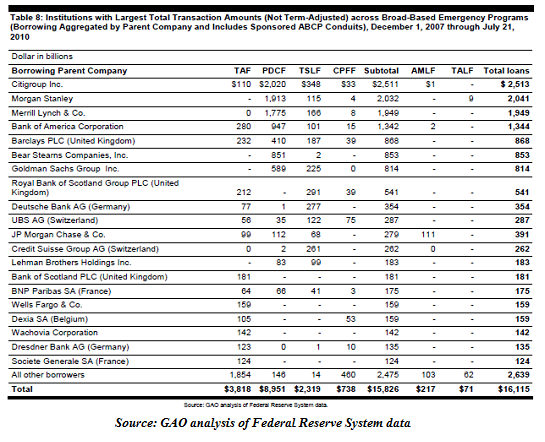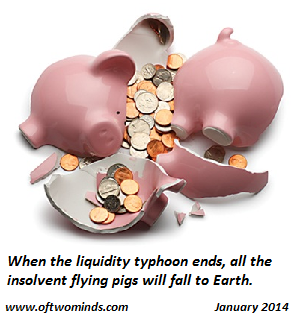The monetary tectonic plates are shifting, and predicting the next global financial earthquake is relatively easy.
I recently suggested that the devaluation of the yen was Japan's Monetary Pearl Harbor: a direct attack on the currencies of its major trading partners: the euro (European Union), the won (South Korea), the Australian dollar (AUD) and the U.S. dollar (USD), which affects both the U.S. and China since China's currency, the renminbi, is pegged to the USD.
Though there have been no overt (that is to say, public) counter-attacks, this may not reflect monetary peace so much as an undeclared war. Correspondent Mark G. observed that the current geopolitical backdrop is considerably more unsettled than the relatively benign global chessboard in 2008:
"The Eurozone and the Pacific Rim now have a pair of regional wars being fought out primarily by financial and monetary means. We can infer that the major central banks won't be anywhere near as cooperative during a crisis as they were in 2008."
While the American-European financial sanctions against Russia and Russia's counter-moves are being waged in public, the public response of the Korean and Chinese central banks to Japan's massive devaluation has been limited to grumbling.
But it is unlikely that other central banks are limiting their response to Japan's aggressive devaluation to words.
Let's start by noting that central banks play two games: one is pure public relations: marionettes on strings beat deflation with sticks and declare they'll save financial parasites with "whatever it takes" monetary policies.
Meanwhile, their actions may be mere shadows of the bold policies being trumpeted, or they may be extremes nobody dares make public, for example the Federal Reserve's $16 trillion bailout of literally the entire Western banking sector in the last Global Financial Meltdown.
(The Levy Institute came up with $29 trillion after poring over all the data):
The U.S. Fed has remained mute, but the yen devaluation has destabilized the global monetary order, whether the Fed acknowledges it publicly or not.
Unsurprisingly, central bank public statements don't mention that competing devaluations share certain characteristics with circular firing squads. Beggar thy neighbor policies destabilize currency flows, and from there, imports and exports, and from there, domestic regimes.
Is there a beneficiary of devaluations and shadow currency wars? It's not too difficult to imagine gold will eventually be revalued to reflect the decline in purchasing power of devalued currencies. It's also not too difficult to anticipate capital flows into whatever currency isn't being actively devalued--for example, the U.S. dollar.
One peculiar consequence of choosing not to devalue one's currency is the resulting inflows of capital fleeing devaluing currencies act as a form of quantitative easing: some of that capital flows into Treasury bonds, effectively replacing the Federal Reserve's QE bond purchases.
The monetary tectonic plates are shifting, and predicting the next global financial earthquake is relatively easy. Predicting the timing and the winners--now that's tricky.
Get a Job, Build a Real Career and Defy a Bewildering Economy(Kindle, $9.95)(print, $20)
 Are you like me? Ever since my first summer job decades ago, I've been chasing financial security. Not win-the-lottery, Bill Gates riches (although it would be nice!), but simply a feeling of financial control. I want my financial worries to if not disappear at least be manageable and comprehensible.
Are you like me? Ever since my first summer job decades ago, I've been chasing financial security. Not win-the-lottery, Bill Gates riches (although it would be nice!), but simply a feeling of financial control. I want my financial worries to if not disappear at least be manageable and comprehensible.
And like most of you, the way I've moved toward my goal has always hinged not just on having a job but a career.
You don't have to be a financial blogger to know that "having a job" and "having a career" do not mean the same thing today as they did when I first started swinging a hammer for a paycheck.
Even the basic concept "getting a job" has changed so radically that jobs--getting and keeping them, and the perceived lack of them--is the number one financial topic among friends, family and for that matter, complete strangers.
So I sat down and wrote this book: Get a Job, Build a Real Career and Defy a Bewildering Economy.
It details everything I've verified about employment and the economy, and lays out an action plan to get you employed.
I am proud of this book. It is the culmination of both my practical work experiences and my financial analysis, and it is a useful, practical, and clarifying read.
Test drive the first section and see for yourself. Kindle, $9.95 print, $20
"I want to thank you for creating your book Get a Job, Build a Real Career and Defy a Bewildering Economy. It is rare to find a person with a mind like yours, who can take a holistic systems view of things without being captured by specific perspectives or agendas. Your contribution to humanity is much appreciated."
Laura Y.
Gordon Long and I discuss The New Nature of Work: Jobs, Occupations & Careers(25 minutes, YouTube)
NOTE: Contributions/subscriptions are acknowledged in the order received. Your name and email remain confidential and will not be given to any other individual, company or agency.
| Thank you, Institute for the Advancement of Journalistic Clarity ($10), for your most generous contribution to this site-- I am greatly honored by your support and readership. | |


 Are you like me? Ever since my first summer job decades ago, I've been chasing financial security. Not win-the-lottery, Bill Gates riches (although it would be nice!), but simply a feeling of financial control. I want my financial worries to if not disappear at least be manageable and comprehensible.
Are you like me? Ever since my first summer job decades ago, I've been chasing financial security. Not win-the-lottery, Bill Gates riches (although it would be nice!), but simply a feeling of financial control. I want my financial worries to if not disappear at least be manageable and comprehensible.


























